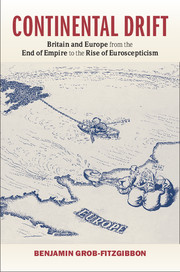Book contents
- Frontmatter
- Dedication
- Contents
- Acknowledgements
- List of abbreviations
- Introduction
- Part 1 Imperial Europeans
- Part 2 Post-imperial Eurosceptics
- 10 At sixes and sevens
- 11 Towards the Common Market
- 12 The rise of the anti-Marketeers
- 13 Empire eclipsed, Europe embraced, Britain rejected
- 14 Entering the promised land? Britain joins ‘Europe’
- 15 Seasons of discontent
- 16 Half-hearted Europeans
- 17 Mrs Thatcher, John Major and the road to European Union
- Conclusion: Post-imperial Britain and the rise of Euroscepticism
- Notes
- Bibliography
- Index
14 - Entering the promised land? Britain joins ‘Europe’
from Part 2 - Post-imperial Eurosceptics
Published online by Cambridge University Press: 05 May 2016
- Frontmatter
- Dedication
- Contents
- Acknowledgements
- List of abbreviations
- Introduction
- Part 1 Imperial Europeans
- Part 2 Post-imperial Eurosceptics
- 10 At sixes and sevens
- 11 Towards the Common Market
- 12 The rise of the anti-Marketeers
- 13 Empire eclipsed, Europe embraced, Britain rejected
- 14 Entering the promised land? Britain joins ‘Europe’
- 15 Seasons of discontent
- 16 Half-hearted Europeans
- 17 Mrs Thatcher, John Major and the road to European Union
- Conclusion: Post-imperial Britain and the rise of Euroscepticism
- Notes
- Bibliography
- Index
Summary
The French rejection of Britain's application to join the European Economic Community (EEC) was not the only shock to rock British politics that November. On the eighteenth of the month, Wilson was forced to devalue the pound by 14.3 per cent to just $2.40. His actions confirmed publicly what many had already known in private: the government was no longer able to manage the sterling crisis without drastic intervention, despite having received more than $4,370 million from the International Monetary Fund (IMF) and other central banks since 1964. The November crisis was ‘shorter in duration and – until the last hours – less intense than those which sterling had weathered in the three preceding years’, but Wilson was under no illusions about its seriousness. In his memoirs, he wrote ominously, ‘this time it was lethal’.
American President Johnson applauded Wilson's courage in devaluing the pound but could not hide his dismay at the hard times upon which the United Kingdom had fallen. Commenting that it was ‘somehow just wrong for Britain to be off balance this way’, he promised that Wilson would have his support at the IMF, adding that his ‘faith’ was ‘deep that the British people have the will and the means both to pay their way and to continue to play the part they must in the world’. The Conservative opposition and British press were less kind. Ted Heath seized upon Wilson's words that the ‘pound in the pocket’ would not be effected by devaluation, and, from that point until the 1970 General Election, a centre-piece of Conservative rhetoric was that Wilson had lied. The conservative newspapers – particularly the Daily Express and Daily Mail – spent countless columns highlighting the effects of devaluation on everyday price increases, and even de Gaulle's infamous ‘non’ to British EEC membership ten days later did little to draw attention from the failing British economy. As Wilson later wrote, British politics at that time became ‘totally dominated by devaluation’.
The UK's economic crisis not only affected the value of sterling but also its worldwide commitments. In the summer of 1967, the cabinet concluded that it needed to reduce its military commitments in order to find economic efficiencies, particularly in the area east of Suez.
- Type
- Chapter
- Information
- Continental DriftBritain and Europe from the End of Empire to the Rise of Euroscepticism, pp. 332 - 366Publisher: Cambridge University PressPrint publication year: 2016



